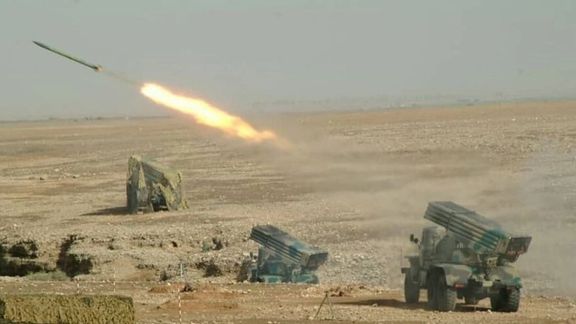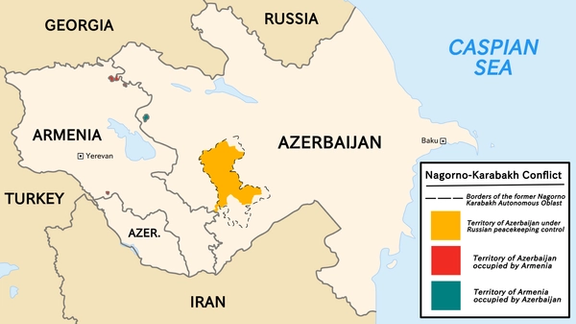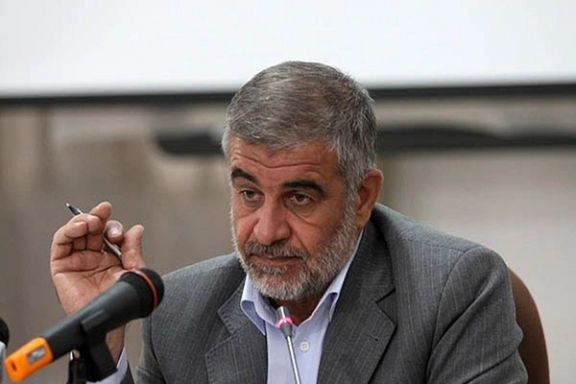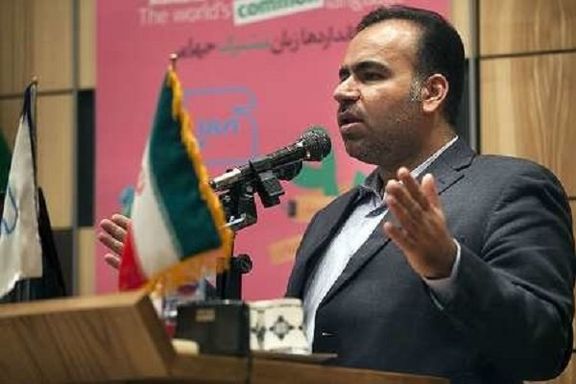Iran Claims It Arrested Several Linked To Assassination Of IRGC Colonel

Iran claims that several people have been arrested in connection with the assassination of a member of its Revolutionary Guard Quds Force.

Iran claims that several people have been arrested in connection with the assassination of a member of its Revolutionary Guard Quds Force.
Judiciary spokesperson Masoud Setayeshi said on Tuesday that the case for the killing of Colonel Hassan Sayyad-Khodaei --, responsible for operations outside Iran’s borders – is still in its initial investigations phase, expressing hope that the main culprits will be identified and arrested in the near future.
Such terrorist acts are the work of complex networks and need thorough technical investigations, he said, but noted that several people have been detained and charged in this regard.
Sayyad-Khodaei was the acting commander of a covert group within the Quds Force known as Unit 840, tasked with abductions and assassinations around the world, including Israeli civilians and officials.
Khodaei was killed outside his home on a residential street in Tehran on May 22, when two gunmen on a motorcycle approached his car and fired five bullets at him and fled the scene. Iran blamed Israel and vowed revenge for the killing.
According to an article by The New York Times, Khodaei was in charge of the unit’s operations in the Middle East and countries neighboring Iran. Over the past two years, he had also been involved in attempted terrorist attacks against Israelis, Europeans and American civilians and government officials in Columbia, Kenya, Ethiopia, the United Arab Emirates, and Cyprus. The article quoted an Israeli intelligence official as saying that Tel Aviv has informed American officials it was responsible for the killing.

A White House official says the US seeks to be involved in joint regional missile defense against Iran to make sure Israel can continue to defend itself.
US Deputy Assistant Secretary for Regional Security Mira Resnick said at The Jerusalem Post Annual Conference in New York on Monday that “We will make sure Israel can continue to defend itself and respond to the many threats that surround it,” she added, highlighting Iran’s “very destabilizing role in the region” as a reason for Washington’s support for the defense efforts.
When it comes to Israel’s defense, she said, “the US is absolutely supportive of Israel,” citing the $3.8 billion in defense aid Israel provides annually, in addition to the $1 billion to revamp the Iron Dome missile defense system last year.
She added that such partnerships need to expand into other areas in order to be sustainable, mentioning ties in trade, sports and other areas as some examples. “This is something the US wants to foster. There’s no silver bullet to this challenge and we’ll need to work together,” she said.
In June, the US Senate and House Abraham Accords Caucus unveiled a bipartisan, bicameral effort to create a united front against the Iranian aggression in the Middle East, something that has been worrying the Islamic Republic ever since.
The legislation proposes that the Pentagon work with Israel to integrate air defenses of six GCC countries of Bahrain, Kuwait, Oman, Qatar, Saudi Arabia, and the United Arab Emirates with Egypt, Jordan, and Iraq with the aim of thwarting threats from Iran and Iranian backed-militias across the region.

Iran has reacted to military clashes between neighbors Armenia and Azerbaijan, reiterating that it would not accept any border changes between the two countries.
Foreign ministry spokesman Nasser Kanaani was quoted by the official government news website IRNA as saying that Tehran was following “this issue carefully” and offered Iran’s help to resolve differences.
Armenia said on Tuesday that at least 49 of its soldiers had been killed in clashes along the border with Azerbaijan after a sharp escalation in hostilities which prompted Russia and the United States to call for restraint.
The escalation of decades-old hostilities between the south Caucasus countries has fuelled fears that a second fully-fledged war could break out in the post-Soviet world in addition to Russia's invasion of Ukraine.
Iran has to an extent supported Armenia in the conflict with Azerbaijan and has warned that it would not allow any seizure of territory from Armenia proper by Baku. Tehran in the past has also expressed alarm at alleged Israeli military presence in Azerbaijan. Foreign Minister Hossein Amir-Abdollahian also warned in October 2021 that Iran will not tolerate "geopolitical change" in the region and at the borders.
Armenia said Tuesday that several towns near the border with Azerbaijan, including Jermuk, Goris and Kapan, were being shelled in the early hours of Tuesday, and that it had responded to what it called a "large-scale provocation" by Azerbaijan.
Baku said it was attacked by Armenia.
Armenian Prime Minister Nikol Pashinyan accused Azerbaijan of attacking Armenian towns because it did not want to negotiate over the status of Nagorno-Karabakh, an enclave which is inside Azerbaijan but mainly populated by ethnic Armenians.

"The intensity of hostilities has decreased but attacks on one or two fronts from Azerbaijan continue," Pashinyan said in a speech to parliament, according to Russian media.
Azerbaijan, which accused Armenia of carrying out intelligence activity along the border and moving weapons, said its military positions came under attack by Armenia. Azeri media reported that a ceasefire agreement had been broken almost immediately after being enforced early on Tuesday.
‘No military solution’
Both Russia and the United States called on Baku and Yerevan to observe restraint.
"As we have long made clear, there can be no military solution to the conflict," US Secretary of State Antony Blinken said in a statement. "We urge an end to any military hostilities immediately."
The Russian foreign ministry said in a statement that the conflict between Armenia and Azerbaijan "should be resolved exclusively through political and diplomatic means".
Russia, which operates a military base in Armenia, sent thousands of peacekeepers to the region in 2020 as part of a deal to end six weeks of hostilities during which Azerbaijan make significant territorial gains in and around Nagorno-Karabakh.
Moscow is a key power broker in the region and an ally of Yerevan through the Moscow-led Collective Security Treaty Organization (CSTO), which convened on Tuesday to discuss the situation. Turkey backs Azerbaijan.
The defense ministers of Armenia and Russia spoke on Tuesday morning and agreed to take steps to stabilise the situation on the border. Turkish Foreign Minister Mevlut Cavusoglu talked to his Azeri counterpart Jeyhun Bayramov and called for Armenia to "cease its provocations".
Charles Michel, president of the European Council, also urged Pashinyan to prevent further escalation. Michel met with Pashinyan and Azerbaijaini President Ilham Aliyev last month in Brussels.
With reporting by Reuters

A bill introduced last year in Iran’s parliament to further restrict access to Internet did not get support, so the governing hardliners found an alternative way.
Mohammad Saleh Jokar a hardliner lawmaker told the media on Monday, that that the bill has been handed over to the Supreme Council of Cyberspace and nothing can be done about it.
Jokar, who is an IRGC general, called on other lawmakers not to follow the case any longer as "this is a job done" and that "there is nothing to be followed up about the case." He said the bill is no longer on the agenda of the Majles.
To dissuade lawmakers from following up the matter, he added: "The bill is now like a dead man who is buried. What are you looking for now?"
The Siyanat (Protection) plan is a draft bill from June 2021 by ultra-hardliners titled “Legislation to Protect Cyberspace Users’ Rights”. An ad hoc parliamentary committee in February approved the outlines of the Siyanat bill which will result in broad restrictions on social messaging platforms and access to the global net.
Many Iranians on social media have expressed concern over the handover of the case to the Supreme Council of Cyberspace which operates under the supervision of Supreme Leader Ali Khamenei.
Moderate website Rouydad24 quoted Mohammad Keshvari of the council as saying that the bill has been already approved and the executive bodies involved have been duly notified.

Explaining the process lawmaker Jalal Rashidi Koochi said some of those who initiated the motion to restrict Internet access at the Majles, are also present at the Supreme Council of Cyberspace. So, when they found out that the Majles is against the bill, they took it to the council for approval.
Former lawmaker Ali Motahari had said in a September 10 tweet: "According to the Constitutional Law, no institution other than the parliament (Majles) is entitled to make laws." He added: "The recent resolution by the Supreme Council of Cyberspace is in fact the same as the former bill to restrict Internet access that remained inconclusive at the Majles."
Motahari pointed out that "This is some kind of legislation and therefore, it is not valid." He warned that it is time for the Majles to defend the people and its own rights."
Meanwhile, another former lawmaker, Soheila Jelodarzadeh, said in an interview on Monday, "What is the role of the Majles if councils are going to make laws?" She further called on lawmakers to defend the authority of the parliament.
Ms. Jelodarzadeh added that the bill to restrict Internet access was sent to the Majles several times before and it was rejected it every time. “This means that restricting Internet access is not something the people of Iran want." She further stressed that "The revolutionary Majles should uphold and safeguard the rights of the nation."
She stressed that "In the age of communication we should be moving toward expanding access to cyberspace rather than trying to restrict it," adding that the people of Iran do not like the idea of creating a closed network inside Iran and restrict people's access to the outside world.
Earlier, in a statement released in March 2022 The US State Department criticized Iran over its plans to tighten Internet access and urged the government “to allow its citizens to exercise their right to freedom of expression and to freely access information.” The statement also said that the so-called “User Protection Bill" aims to further limit Internet access, increasing censorship and restricting free speech online.”

As Iranian doctors are emigrating to other countries in droves, the health ministry has increased the exit permit bond for medical, dental and pharmacy students to $5,000 per year.
Deputy minister for education at the health ministry, Abolfazl Bagherifard, said on Monday that students in graduate levels should provide 1.5 billion rials ($5,000) to leave the country for a year and undergraduate levels should provide bonds worth $2,000.
Students must provide an official letter of commitment to return as well as another person's guarantee by depositing a real estate bond or a bank guarantee.
Officials and lawmakers are warning that Iran may be forced to hire foreign doctors as Iranian physicians are leaving in high numbers. Dr Mohammad Raeeszadeh, the head of Medical Council of the Islamic Republic of Iran, recently warned that wrong government policies is causing disillusionment among young medical practitioners and could lead to a wave of emigration or change of career among them.
Earlier in the year in April, Iran's Medical Council said about 4,000 doctors have applied for Certificates of Good Standing in the past 12 months with the intent to leave the country. Council spokesman Reza Laripour said that the annual number of such applications was less than 600 between 2013 and 2015.
An opinion survey conducted in August indicated that almost half of Iranian youth want to leave the country amid pessimism about their future.

The Iran-Iraq Joint Chamber of Commerce announced on Monday that contrary to government’s claim, Iran's exports to Iraq have decreased in the past five months.
The head of Iran-Iraq Joint Chamber of Commerce, Jahanbakhsh Sanjabi Shirazi, told ILNA that the exports decreased 8 percent in terms of value and 28 percent in terms of weight.
He said the main reason behind the drop is the elimination of cheap government dollars for importing raw material, noting that after its removal prices of Iranian-made products rose above the global baseline, and the first reaction of customers was to stop buying goods.
The drop in Iran's exports to Iraq, which is the country’s second largest trade partner, comes as a member of Iran's Chamber of Commerce admitted in February that Iran is losing Iraq's $30 billion market.
On Sunday, September 11, the head of the Iranian Association of Exporters of Technical and Engineering Services, Bahman Salehi-Javid, said the country’s export of such services has declined to about $500 million from the figure of $5 billion about 10 years ago.
US sanctions have dramatically reduced Iran’s export revenues. Not only Tehran is getting less than half of its usual oil income, but trade in general has suffered because of US banking sanctions, forcing Iran to offer low prices.